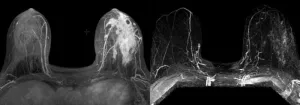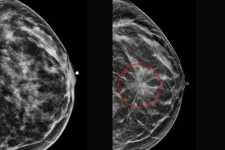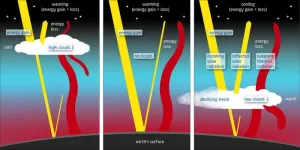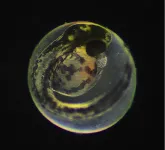(Press-News.org) A groundbreaking phase one clinical trial exploring a novel cell-based immunotherapy for breast cancer has been accepted for publication in JAMA Oncology. The technology tested in the trial was co-developed by Gary Koski, Ph.D., professor in Kent State University’s Department of Biological Sciences, and Brian J. Czerniecki, M.D., Ph.D., chair and senior member in the Moffitt Cancer Center’s Department of Breast Oncology. The study focuses on a new treatment approach that aims to harness the body’s immune system to enhance patient responses and reduce the need for conventional chemotherapy and its associated toxicities.
The trial involved 12 patients with locally advanced stage I-III HER2 breast cancer. This research builds upon insights gained from previous studies funded by a Department of Defense Breakthrough Award research grant.
“We are hopeful that we will be able to use this new immunotherapy instead of chemotherapy, or at least dramatically reduce the need for chemotherapy, for all types of breast cancer,” Czerniecki said.
The immunotherapy leverages dendritic cells, critical components of the immune system that normally identify infection and mobilize other elements of immunity to repel a microbial attack. By removing some of these dendritic cells from the body, biochemically reprogramming them for anti-cancer activity and injecting them directly into breast tumors, the researchers could trigger a powerful, organized immune system attack on the cancer. This led to the significant shrinkage of tumors before standard chemotherapy was administered.
Eight out of the 12 patients demonstrated at least a 50% reduction in tumor volume after just six weeks of immunotherapy. This treatment produced only minimal side effects, primarily mild flu-like symptoms, compared with the severe side effects often associated with traditional chemotherapy.
“These exciting results are the culmination of nearly 30 years of collaborative research between my laboratory and Dr. Czerniecki’s,” Koski said.
The researchers have already begun a larger phase two trial to test higher doses of the immunotherapy, further exploring the potential effectiveness of this new technology.
The published clinical trial was supported by the Moffitt Breast Cancer Research Fund, the Don Shula Foundation and donations from the Pennies in Action organization, which has raised approximately $7 million over the last decade to support this innovative cancer research. This unique funding model allows patients to directly contribute to advancements in treatments that may benefit them and others in the future.
About Gary Koski and Brian Czerniecki
Koski has been teaching at Kent State, an R1 top-tier research university, since 2010 and is a recipient of Kent State’s Distinguished Teaching Award. He earned his zoology pre-med degree from Kent State before getting a Ph.D. in immunology and infectious disease at Johns Hopkins University. After receiving his doctorate, he conducted research at the National Institutes of Health, University of Pennsylvania Medical School and Cleveland Clinic. He currently teaches Immunology and Principles of Infectious Disease and pursues research in the areas of immunology, cancer immunotherapy and dendritic cell biology.
For more information about Kent State’s Department of Biological Sciences, visit www.kent.edu/biology.
Czerniecki received his Bachelor of Science in Biochemistry from the University of Maine and his Doctor of Medicine from the University of Medicine and Dentistry of New Jersey (UMDNJ), Robert Wood Johnson Medical School, and his Ph.D. from UMDNJ-Robert Wood Johnson and Rutgers University. He completed his general surgical residency at Ohio State University and was Surgical Oncology Fellow at the National Cancer Institute prior to his position at the University of Pennsylvania, Philadelphia. While at the University of Pennsylvania, Dr. Czerniecki served as professor of surgery, Perelman School of Medicine; attending surgeon, Department of Surgery, Hospital of the University of Pennsylvania; and co-director of the Rena Rowan Breast Center–Recruitment and Center Expansion. His research interests focus on dendritic cell biology and interactions with T cells. He has developed dendritic cell vaccines for the treatment of cancer. He is known nationally for his contribution to the development of sentinel lymph node mapping, a procedure for determining the spread of cancer into lymph nodes that is less invasive than diagnostic surgery.
For more information about Czerniecki and Moffitt Cancer Center, visit www.moffitt.org/providers/brian-czerniecki/.
# # #
Photo Caption:
The top image is Gary Koski, Ph.D., professor (left) and Carissa Lepore, Ph.D., a lab team member and research scientist in the Department of Biological Sciences at Kent State University, in Koski's Cunningham Hall laboratory on the Kent Campus.
Media Contacts:
Jim Maxwell, JMAXWEL2@kent.edu, 330-672-8028
Emily Vincent, evincen2@kent.edu, 330-672-8595
END
Innovative immunotherapy shows promise in early clinical trial for breast cancer
Researchers from Kent State and Moffitt Cancer Center hope to replace – or dramatically reduce – need for chemotherapy for breast cancer treatment
2024-12-05
ELSE PRESS RELEASES FROM THIS DATE:
Whiteness as a fundamental determinant of health in rural America
2024-12-05
WASHINGTON -- White people in rural America have unique factors that drive worse health outcomes than their urban counterparts, prompting a team of public health researchers to label whiteness as a fundamental determinant of health. They say while the health and well-being of racially minoritized populations should continue to be a research priority they urge researchers to consider factors that influence the health of majoritized populations.
In an analytic essay, "Whiteness: A Fundamental Determinant of the Health of Rural White Americans,” published Dec. 5 in the American Journal of Public Health, Caroline Efird, PhD, MPH, ...
Analyzing multiple mammograms improves breast cancer risk prediction
2024-12-05
A new study from Washington University School of Medicine in St. Louis describes an innovative method of analyzing mammograms that significantly improves the accuracy of predicting the risk of breast cancer development over the following five years. Using up to three years of previous mammograms, the new method identified individuals at high risk of developing breast cancer 2.3 times more accurately than the standard method, which is based on questionnaires assessing clinical risk factors alone, such as age, race and family history of breast cancer.
The study is published ...
Molecular zip code draws killer T cells straight to brain tumors
2024-12-05
More information, including a copy of the paper, can be found online at the Science press package at https://www.eurekalert.org/press/scipak.
Molecular Zip Code Draws Killer T Cells Straight to Brain Tumors
Researchers have found a way to program immune cells to attack glioblastoma and treat the inflammation of multiple sclerosis in mice. The technology will soon be tested in a clinical trial for people with glioblastoma.
UCSF scientists have developed a “molecular GPS” to guide immune cells into the brain and kill tumors without harming healthy tissue.
This living cell therapy can navigate through the body to a specific organ, addressing ...
Engineered immune cells may be able to tame inflammation
2024-12-05
More information, including a copy of the paper, can be found online at the Science press package at https://www.eurekalert.org/press/scipak.
Engineered Immune Cells May Be Able to Tame Inflammation
Immune cells that are designed to soothe could improve treatment for organ transplants, type 1 diabetes and other autoimmune conditions.
When the immune system overreacts and starts attacking the body, the only option may be to shut the entire system down and risk developing infections or cancer.
But now, scientists at UC San Francisco may have found a more precise way to dial the immune system down.
The technology ...
Rapid surge in global warming mainly due to reduced planetary albedo
2024-12-05
Rising sea levels, melting glaciers, heatwaves at sea – 2023 set a number of alarming new records. The global mean temperature also rose to nearly 1.5 degrees above the preindustrial level, another record. Seeking to identify the causes of this sudden rise has proven a challenge for researchers. After all, factoring in the effects of anthropogenic influences like the accumulation of greenhouse gases in the atmosphere, of the weather phenomenon El Niño, and of natural events like volcanic eruptions, can account for a major portion of the warming. But doing so still leaves a gap of roughly 0.2 degrees Celsius, which has never been satisfactorily ...
Single mutation in bovine H5N1 switches viral binding specificity to human receptors
2024-12-05
A single mutation in bovine influenza H5N1 – a clade of the highly pathogenic avian influenza virus that has been increasingly detected among North American livestock herds – can cause the virus to switch affinity from animal-type receptors to human-type receptors, according to a new study. The findings highlight the crucial need for continuous surveillance of emerging H5N1 mutations, as even subtle genetic changes could increase the virus's capacity for human adaptation and transmission, potentially triggering a future influenza pandemic. In 2021, the highly pathogenic influenza H5N1 clade ...
Discovered: the neuroendocrine circuit that dictates when fish are ready to hatch
2024-12-05
Researchers have uncovered a previously unknown yet crucial role for thyrotropin-releasing hormone (Trh) in zebrafish hatching and reveal how this hormone activates a transient neuroendocrine circuit that controls when fish larvae are ready to leave the egg and swim free. For egg-born animals, hatching marks a pivotal shift, transitioning from the sheltered environment of an egg capsule to external conditions. This crucial event is not strictly hardwired into the embryo’s developmental program. Rather, hatching is a regulated ...
Climate change threatens global biodiversity, with extinction risks escalating at higher temperatures
2024-12-05
Climate change is driving global extinction risks, with 1.6% of species threatened at 1.3°C of warming and risks escalating to 29.7% at 5.4°C, according to a new meta-analysis encompassing more than 30 years of research. Climate change is reshaping ecosystems and biodiversity globally, altering species distributions, interactions, and population dynamics. While some species adapt or migrate to track shifting climates, others face population declines, shrinking ranges, and potential extinction. ...
Scientists ‘turn up the heat’ on understanding coffee wilt disease which threatens our favourite daily brew
2024-12-05
Scientists, including those from Imperial College London, University of Oxford and CABI, have ‘turned up the heat’ on how repeated outbreaks of coffee wilt disease threatened arabica and robusta varieties of our favourite daily coffee brew.
The scientists, who present their findings in the journal PLoS Biology, say the fungal pathogen Fusarium xylarioides continues to pose a significant threat to coffee production and incomes across sub-Saharan Africa.
Their work supports earlier findings, based on DNA markers and crossing experiments which suggested that F. xylarioides is ...
Researchers crack the code of how fish pick their own birthday
2024-12-05
New research has revealed that fish embryos actively control their hatching timing through a neurohormone, Thyrotropin-Releasing Hormone (TRH), which triggers the release of enzymes that dissolve the egg wall. This groundbreaking discovery uncovers a previously unknown neural mechanism that governs a critical life-stage transition, showing that embryos are not passive but instead actively make life-or-death decisions. The finding has significant evolutionary implications, offering new insights into neurobiology, survival strategies, and environmental adaptation in vertebrates.
Dr. ...
LAST 30 PRESS RELEASES:
Scientists discover why we know when to stop scratching an itch
A hidden reason inner ear cells die – and what it means for preventing hearing loss
Researchers discover how tuberculosis bacteria use a “stealth” mechanism to evade the immune system
New microscopy technique lets scientists see cells in unprecedented detail and color
Sometimes less is more: Scientists rethink how to pack medicine into tiny delivery capsules
Scientists build low-cost microscope to study living cells in zero gravity
The Biophysical Journal names Denis V. Titov the 2025 Paper of the Year-Early Career Investigator awardee
Scientists show how your body senses cold—and why menthol feels cool
Scientists deliver new molecule for getting DNA into cells
Study reveals insights about brain regions linked to OCD, informing potential treatments
Does ocean saltiness influence El Niño?
2026 Young Investigators: ONR celebrates new talent tackling warfighter challenges
Genetics help explain who gets the ‘telltale tingle’ from music, art and literature
Many Americans misunderstand medical aid in dying laws
Researchers publish landmark infectious disease study in ‘Science’
New NSF award supports innovative role-playing game approach to strengthening research security in academia
Kumar named to ACMA Emerging Leaders Program for 2026
AI language models could transform aquatic environmental risk assessment
New isotope tools reveal hidden pathways reshaping the global nitrogen cycle
Study reveals how antibiotic structure controls removal from water using biochar
Why chronic pain lasts longer in women: Immune cells offer clues
Toxic exposure creates epigenetic disease risk over 20 generations
More time spent on social media linked to steroid use intentions among boys and men
New study suggests a “kick it while it’s down” approach to cancer treatment could improve cure rates
Milken Institute, Ann Theodore Foundation launch new grant to support clinical trial for potential sarcoidosis treatment
New strategies boost effectiveness of CAR-NK therapy against cancer
Study: Adolescent cannabis use linked to doubling risk of psychotic and bipolar disorders
Invisible harms: drug-related deaths spike after hurricanes and tropical storms
Adolescent cannabis use and risk of psychotic, bipolar, depressive, and anxiety disorders
Anxiety, depression, and care barriers in adults with intellectual and developmental disabilities
[Press-News.org] Innovative immunotherapy shows promise in early clinical trial for breast cancerResearchers from Kent State and Moffitt Cancer Center hope to replace – or dramatically reduce – need for chemotherapy for breast cancer treatment




